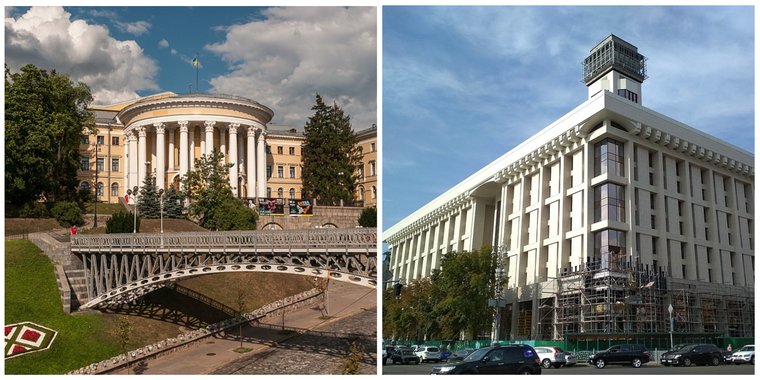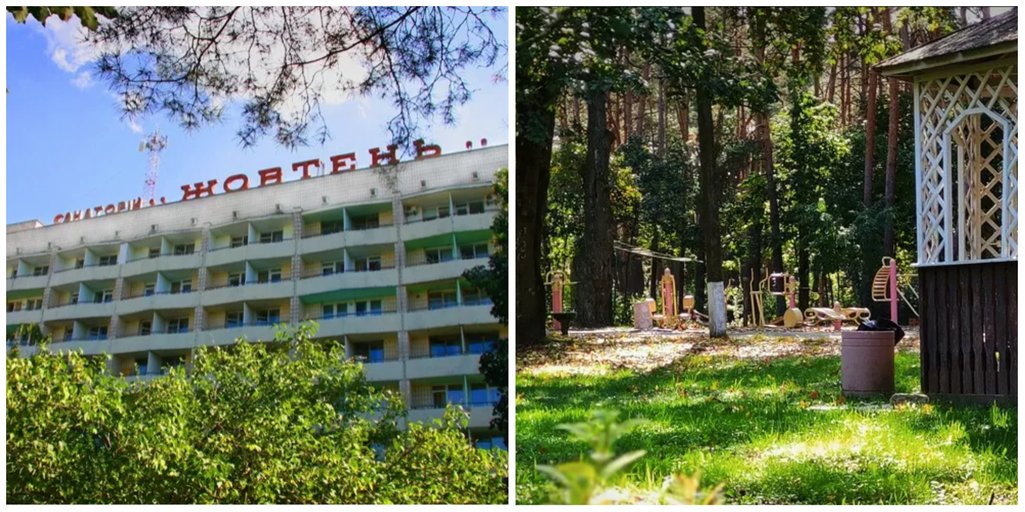As the Ukrainian government continues radical workplace reforms, it wants to seize unions’ prestigious Soviet-era buildings
Serhiy Guz is a Ukrainian journalist and one of the founders of the country’s journalism trade union movement. He headed Ukraine’s independent media union between 2004 and 2008, and is currently a member of Ukraine’s Commission on Journalistic Ethics, a self-regulation body for the country’s media. He is also a council member of the Voice of Nature NGO and editor-in-chief of the Clever City Kamianske newspaper.
Cross-posted from Open Democracy

Kyiv’s October Palace and Trade Unions Building are central locations in the Ukrainian capital – and controlled by the country’s Federation of Trade Unions|
Images: CC BY-SA 4.0 / Void Wanderer / Wikipedia. Some rights reserved. Ralf Roletschek / Roletschek.at.
The Ukrainian parliament is preparing to grant the government powers to confiscate potentially billions of dollars worth of trade union property – in a move widely seen as an attempt to pressurise the country’s main trade union federation.
At stake are dozens of office buildings, sanatoriums, health resorts and cultural and sports complexes built in the late Soviet era, including the giant House of Trade Unions building and the October Palace arts centre, both in central Kyiv. During the final years of the Soviet Union, this property was transferred to what is today the Federation of Trade Unions of Ukraine (FPU) .
The draft law, which was approved by Parliament on 4 November, comes as the Ukrainian government attempts to liberalise workplace protections and reduce trade union rights via a new general labour law. The FPU opposes this draft labour law, claiming it will significantly reduce the role of unions at Ukrainian workplaces.
The FPU claims that by threatening to seize its property, the Ukrainian government is trying to undermine its financial stability. Rent and associated incomes from these buildings make up a significant part of the federation’s finances.
According to a leading Ukrainian legislator, the confiscation powers will help “settle the long and dark history” of Ukrainian trade union property.
Ownership of Soviet-era property
The draft law aims to solve disputes over the ownership of Soviet property that ended up with various organisations, enterprises and individuals after Ukraine declared independence in 1991.
The law does not mention any specific public organisation, but for the most part it is concerned with property that once belonged to the Soviet central trade union council – and which was transferred to the FPU after the collapse of the Soviet Union.
A complete list of the property in question, and its total value, is not publicly available. However, the Ukrainian press has reported over the years that the FPU inherited between 300 and 1,000 Soviet-era sites. In 2006, after Ukraine’s Orange Revolution, independent unions accused the former leadership of the FPU of embezzling property worth $3.5bn.
The FPU insists it controls the property legally. It notes that the Soviet-era property was transferred from the Soviet central trade union council to the Federation of Independent Trade Unions of Ukraine (the predecessor of the FPU) in October-November 1990, a year before the Soviet Union dissolved.
According to FPU head Hryhoriy Osovyi, the FPU’s powers to manage the property were confirmed in January 1992 by a decision of the organisation that took over the central Soviet trade union council.
However, successive Ukrainian governments have believed that they had every right to control the physical remains of the country’s Soviet legacy.

In 2020, a court placed the October Sanatorium, outside Kyiv, under arrest during an investigation into the alleged unlawful privatisation of the locationImage: Ukraine Sanatoria
In 1992 and 1994, the Ukrainian parliament voted to temporarily transfer any property under dispute to the State Property Fund of Ukraine (created in 1991 to manage any state-owned buildings) “until ownership of this property received a legal definition”. However, this never happened and trade union representatives continued to manage the disputed property.
Dmytro Natalukha, the head of the Ukrainian parliament’s committee on economic development, explained the decision to grant confiscation powers now, by saying that the property “was used by private individuals, self-proclaimed leaders of trade unions, who privatised it, sold it, rented it out or simply destroyed it, as if it were their own. Palaces of culture became trading centres. Sanatoriums and recreation centres [became] prestigious private towns, beach clubs or spas.”
The Ukrainian government plans to house people displaced by the Russian invasion in sanatoriums and hotels that have already been seized from the FPU. The FPU says these properties are already occupied by displaced persons, at a capacity of 50-90%.
Previous attempts to seize trade union property
The property seizure powers were originally mooted during a period of confrontation between the FPU and the Zelenskyi administration in 2020-21, when Ukraine’s Ministry of Economy made its first attempt to pass a new general labour law. Amid protests organised by trade unions against the proposals, including the FPU, a series of trade union properties were seized. Today, protests are forbidden in Ukraine under martial law.
In fact, over the past 20 years, different Ukrainian governments have made various attempts to seize trade union property, attracting attention from the country’s regulatory and law enforcement authorities.
In July this year, Ukraine’s State Bureau of Investigation said it had uncovered a “large-scale, multi-million dollar scheme to plunder the property of trade union organisations”. It alleged that trade union officials had sold 80 properties illegally, without the consent of the State Property Fund. On the orders of the bureau, the buildings in question have now been handed over to a state agency set up to manage assets obtained via corrupt practices. An investigation is ongoing.
“Despite the war and the difficult situation in Ukraine, certain pro-government groups have continued their pressure on trade unions, using trade union property as leverage,” FPU deputy head Volodymyr Sayenko said at the time.
That same month, the UN’s International Labor Organization (ILO) called on the Ukrainian government to withdraw the draft legislation on trade union property until it had held a “proper consultation” with the FPU – according to a letter seen by openDemocracy.
The ILO conducted an investigation into the property conflict in 2020, when it encouraged the Ukrainian authorities to “engage in consultations” with trade unions. The agency states that protection of trade union property is essential for unions to exercise their rights.
openDemocracy has previously reported on signs that the relationship between Ukrainian reformers and the ILO has come under strain since Russia’s invasion. The ILO denied any strain at the time.
A senior trade union official, on condition of anonymity, told openDemocracy that trade union property has become a source of “blackmail” for the government.
“Every time [FPU] should have called a strike or made serious demands, the government has used this property to blackmail them,” they said, pointing to criminal investigations into the use or disposal of certain sites.
Speaking about the confiscation powers, Dmytro Natalukha, an MP with the ruling Servant of the People party, said the Ukrainian state had lost control of up to $2bn worth of property due to “raiding” by trade unions since the end of the Soviet Union.
Earlier this year, the FPU said it was “especially cynical” that the Ukrainian parliament planned to vote for confiscation powers in “turbo mode” (under wartime measures that allow it to bypass standard parliamentary procedure) after the European Union had accepted Ukraine’s candidacy in June.
Such powers, it said, were “in no way consistent with Ukraine’s status as an EU candidate country, where the right of ownership is inviolable and confiscation is impossible”.
Last year, the EU “stressed the importance of consulting with trade unions” to the Ukrainian government over any final settlement on property, according to diplomatic correspondence received via a freedom of information request by openDemocracy.
The draft laws on trade union property are set to be debated further by the Ukrainian parliament.
Other controversial labour legislation
Since the Russian invasion, the ruling Servant of the People party has pushed through controversial labour legislation that had already been prepared before the war, at the start of Volodymyr Zelenskyi’s presidency in 2020. Analysts have called the move “opportunistic”.
The aim of this new legislation, the ministry said earlier this year, is to create an “attractive” labour law that would “simplify regulations, minimise state intervention in the regulation of employment and form a system of flexible protection”. The legislation will make it easier for employers to fire staff – and make it nearly impossible for trade unions to resist attempts to fire their members.
It will also reduce trade union influence on wages, workplace safety, length of shifts and conditions. In effect, unions will take on a public monitoring role, rather than protecting the interests of their members.
New legislation already makes it possible for small and medium-sized enterprises to not follow national labour law.
Zelenskyi’s government is also planning a new pension reform – a politically controversial move that the FPU opposes.
The government’s plans for postwar reconstruction have signalled an approach of “non-interference of the state in dialogue between trade unions and employers” – that is, a move away from the ILO-supported ‘social dialogue principle’, whereby the government consults with both trade unions and employers’ associations on economic policy.
Government reconstruction plans have said that Ukrainian workers’ “low loyalty to reforms” and the “active position of resistance taken by trade unions” are “key institutional restraints” to planned reforms.
Thomas Rowley contributed reporting to this article.


Be the first to comment